
The long-anticipated day has finally come, campers: this is, no kidding, honest, and for real, the last Querypalooza post. As of the end of this post, you officially have my blessing to go forth and query your creative little hearts out.
While I would encourage you to continue to shout out any and all query-related comments and questions, this short-in-time-but-long-in-quantity marathon of focused posts will end here. I shall return to my usual rate of blogging only once per day (twice has been killer, thrice insane), and life will return to normal around Author! Author!
At least until Synopsispalooza begins on September 25th; mark your calendars. In the interim, we shall be devoting day after luxurious day to craft, via in-depth textual analysis on the first pages submitted by the winners of the Author! Author! Great First Page Made Even Better Contest..
But before any of that happens, a final post. And then many unbroken hours of glorious snoozing. (I can’t even begin to convey how excited I am at the prospect of sleeping in tomorrow morning, rather than sitting bolt upright in the early morn, crying, “Oh, no! I’ve promised my readers a post by 10 am!” Naturally, I’m excited about critiquing readers’ first pages, but I suspect I won’t actually be logging in to do it until tomorrow afternoon.)
Back to the matter at hand: examples of good and not-so-good queries. Tonight, I thought we would amuse ourselves with a couple of common faux pas before launching into the more serious difficulties of coming up with selling points for a book without an obvious preexisting target audience or credentials at least apparently relevant to the writing of a novel that is purely imaginative.
Yes, those are indeed knotty problems, now that you mention it. All the more reason to kick off with some fun.
As we discussed earlier in this series, both the credentials and target market paragraphs are optional in a query. That’s fortunate, because for most aspiring writers, they are the hardest parts to write. “But I’ve written a book,” hopeful queriers everywhere grumble. “Why should I have to come up with any more proof that I’m a writer than that?”
Good point, hopeful grumblers, but as I’ve noted early and often throughout Querypalooza, the only way Millicent the agency screener can possibly find out what a beautifully-written, grippingly plotted, and/or fascinatingly argued piece of prose you’ve produced is if your query (or pitch) has convinced her to ask to read it. Rather than wasting your energy, however justifiably, upon the tedious necessity of having to query at all, try to think of it as merely a means to an end.
It’s also a learned skill. Which you have now learned, right?
“Yeah, yeah, Anne,” those of you whose eyes lit up a few paragraphs ago at the prospect of some engagingly terrible examples of how to do it wrong. “When do we get to the promised fun?”
Stop drumming your fingers on the table, eager beavers. As in any narrative, a proper set-up is imperative for a joke to work; nothing is less amusing than a joke that has to be explained after it is told.
One of the classic ways that credential-light writers compensate for not having much of a publishing background is by name-dropping. Specifically, by telling Millicent that So-and-So says that the book is X, therefore it is worth her while to read.
Basically, this strategy works (when it does, which is rarely) by rubbing up against someone famous in the hope that the glamour will rub off. When done with restraint — and with a true claim; do be aware that it’s not unheard-of for Millicent to check — the result can be quite eye-catching. See for yourself:
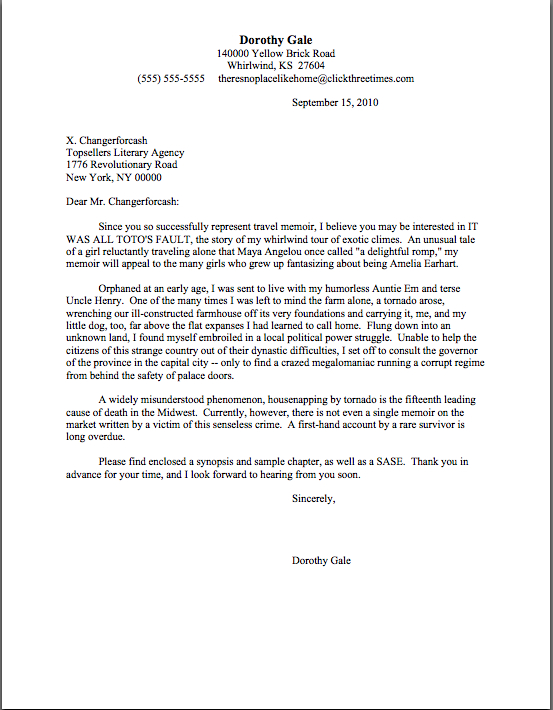
Another name-dropping method that tends to work even better — if, again, the claim in the letter is true — is to garner a referral from one of the agent’s current clients. See how easily Dorothy is able to personalize the basic letter she already had on hand with this information:
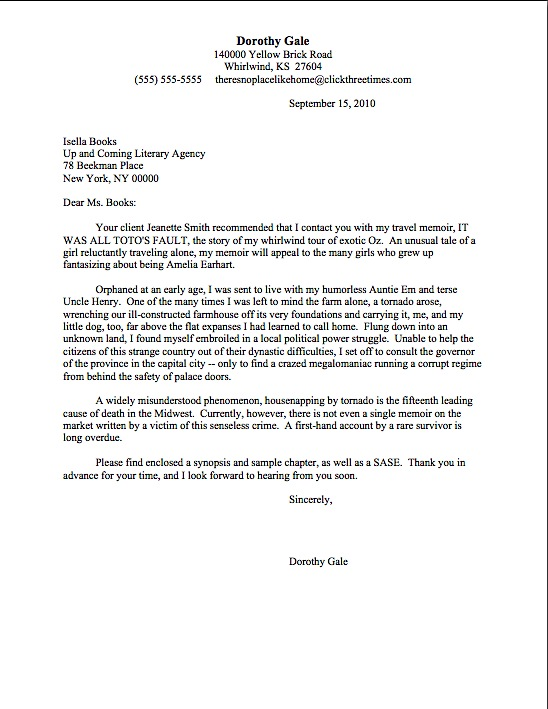
As with every other type of personalization, the primary danger inherent to mention a recommendation in a query is that it is invariably DISASTROUS if a writer inadvertently sends that recommendation to the wrong agency. Due to the ease and consequent popularity of copy-and-paste word processing technology, a tired Dorothy is very, very likely to send precisely the letter above to a different agent without noticing. Especially if, as now has come so common, she simply copied the contents of one e-mail into the body of another and pressed SEND.
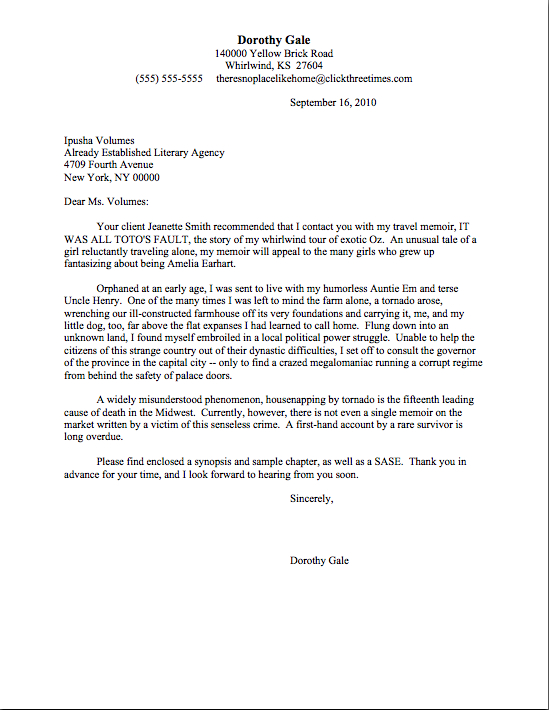
Dorothy may not notice — and, indeed, may never learn of her error, due to the ubiquity of stock rejections devoid of any explanation of why Millicent chose to pass — but a good screener undoubtedly will. “Next!”
And even if Millicent’s overworked (and usually underpaid as well) eyes did by some divine act of Providence happen to glide past the reference to some other agency’s client, this second query would have gotten rejected in Ms. Volumes’ office, anyway. Any guesses why?
It was the enclosed pages. You’d have to have looked at the two agency’s guidelines to figure that one out: while Ms. Books’ agency’s specify that queriers may include chapters and a synopsis in their query packets, Ms. Volumes’ agency guide listing quite clearly reads query only, please.
“Next!”
Hmm, if only there were a way around this problem…oh, wait, there is: read every syllable of everything you send to every query IN ITS ENTIRETY and OUT LOUD, every time. And if you can print a draft copy to read IN HARD COPY, so much the better.
Why, yes, that would add quite a bit of extra time to the querying process, now that you mention it. But isn’t that vastly preferable to the horrifying alternative?
Just this morning, inveterate commenter Dave chimed in with another good strategy for e-mailing queriers:
Might I suggest that folks querying by e-mail write and perfect the query letter in Word or their favorite word processing program. They can print it out, read it aloud, and make sure it’s perfect. Then when it is time to send the query, merely copy and paste into the e-mail. At this point, before hitting SEND, it might also be a good idea to correct any formatting anomalies that may have occurred during the pasting operation.
I find this excellent, Dave; this strategy also permits greater ease in spell- and grammar-checking. (You were already aware that most Millicents are instructed to become wary at the first typo and stop reading after the second, right?) While it may not completely obviate the possibility of mixing up which personalization should be heading to which agency, merely adding another layer of review renders it less likely.
But let’s get back to name-dropping, shall we?
As I mentioned in passing above, if you mention a famous person or someone the agent might conceivably know, it’s imperative that you not stretch the truth about what they might have said about you or your work, even a little. The more potentially impressive a kudo, the more likely Millicent is to wonder about its veracity — and the more likely her boss is to reach for the phone to double-check.
Speaking as someone whose name has been known to turn up in queries from writers of whom I have never heard (you know who you are, presumptuous readers: my agency doesn’t appreciate it, and neither do I), I have to say, those just-checking calls and e-mails are a trifle unnerving. Like many authors, I meet quite a few aspiring writers in any given year; even though I keep records of whom I refer and where, there’s always the nagging fear that I might have forgotten someone.
Unethical queriers prey on that fear, relying upon poverty of memory and laziness of fact-checking to make their sleight-of-hand pay off. And that’s a pity, because this type of name-dropper makes it harder for people like me to refer aspiring writers whose work I honestly do believe my agent might enjoy.
You’re making everyone look bad, Dorothy. Clean up your act, or at least get a few hours’ sleep between Query #37 and Query #38.
Do be careful, too, about taking comments out of context; if asked, the commenter may well become offended if those nice things he said about your writing were not about the book you’re querying. Not every bon mot that falls from the lips of the famous is fair game to co-opt for promotional purposes, after all.
When I was in graduate school, for instance, I took a seminar with Saul Bellow. At the end of the term, I was delighted to see that he had scrawled on the bottom of my term paper, “Your writing is very likable.”
Now, that awfully nice to see, of course; I don’t know about you, but when a Nobel laureate says something positive about my writing, I sit up and take notice. However, would I have been justified in saying Saul Bellow found said my writing was very likeable in every query letter I sent out for the rest of my natural life?
Of course not. The man was talking about a 30-page seminar paper I had written on the novels of Italo Svevo, for heaven’s sake, not — and this would be the implication, if I had ever included his comment in a query letter — one of my novels. Even now that Professor Bellow has joined the choir celestial and could not possibly contest my taking his statement out of context, I would not dream of using it in a query letter or as a jacket blurb.
It just wouldn’t be ethical, would it? Stop fantasizing about being able to drop Saul Bellow’s name in the first line of your query and answer me: would it?
Ethical name-droppers can — and do — run into other kinds of trouble: all too often, they get carried away with the proper nouns, positively littering the page with them. They forget that the power of celebrity lies in its rarity: if a writer can legitimately cite one famous fan of his own work, that’s impressive, but if he lists several, even if they are all genuine fans, it’s going to come across as overkill at best and a complicated lie at worst.
Reluctant to believe that more isn’t better? Judge for yourself:
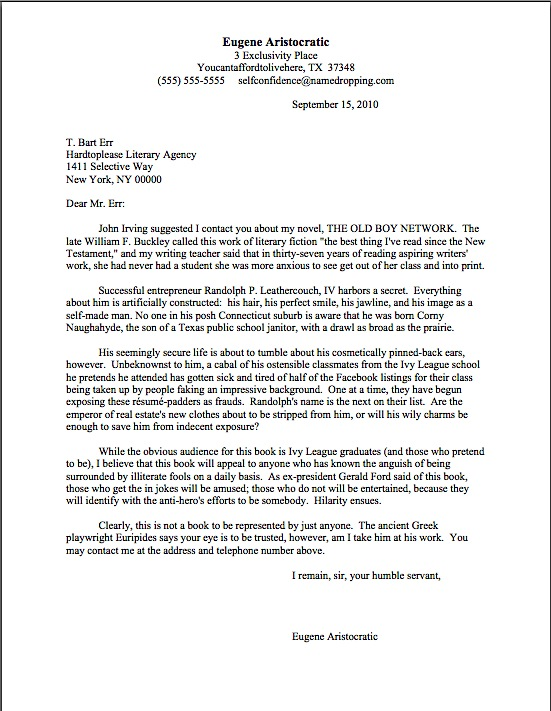
A bit over the top, is it not? One of those famous names might have grabbed Millicent, but so many in a row — including a couple of unverifiable-because-dead endorsers — falls flat. And if anyone at Millie’s agency happens to know anyone in that cavalcade of stars, you can bet that they will take great pleasure in dropping them an e-mail to ask, “So how do you know this Eugene Aristocratic? He didn’t mention why you thought he might be a good fit for our agency.”
And what do you think happens if the late William F. Buckley — or, indeed, anyone Eugene chose to cite in this all-star line-up — says something like, “Eugene who?”
That’s right: “NEXT!”
Oh, you laugh, but you would be surprised at how often unscrupulous queriers will fake recommendations like this. Actually, those who do it might also be surprised at how often they get caught in the attempt: although this is a notorious agents’ pet peeve, perjured name-droppers generally receive precisely the same form-letter rejection as everybody else.
So the wonder is not the fact that people like that never learn, but that after all this time, Millicents across New York have not banded together to come up with a checklist of the most egregious insults to their intelligence commonly found in letters. Imagine how helpful it would be to the clueless if a Millicent could simply grab a list from a photocopied stack, circle doubtful references, and tuck it into the SASE along with the form-letter rejection?
Another pet peeve that would well deserve circling: who?. This feedback would be a boon to name-droppers who reference people of whom Millicent has never heard.
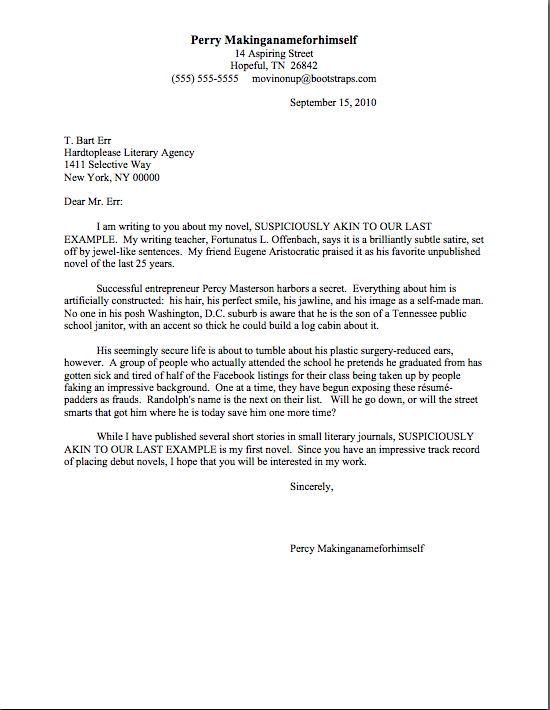
“Who the heck is Fortunatus L. Offenbach?” Millicent mutters, reaching for a form letter. “And why should I care about his opinion on anything? While I’m speculating aloud, isn’t this book description rather similar to the one I read just a few minutes ago — and wait, isn’t the second name here the same as the writer on the other query? Who stole whose book idea, I wonder?”
Oh, yes, our Millie’s memory is that good. And you never can tell whose query she will read just before or just after yours, Eugene.
Connections to the glamorous (or, in Perry’s case, the not-so-glamorous) are not the only query statements that occasionally strike Millicent as far-fetched. As long-time reader Adam points out,
Isn’t there a danger of stretching too much about connections of importance (i.e. penchant for linguistics resulting in witty character names, thesis about Jane Austen gives specialization of domestic inertia and idle chatter, etc)? Might this kind of tack be harder with genre fiction (more difficult, not impossible), or only mean said query-candy-makers need to be more creative/selective?
I don’t see any special reason that coming up with credentials should be harder for genre fiction than any other variety, Adam; in general, fiction writers tend to experience more difficulty in figuring out how to query their work. (Since nonfiction writers have to write book proposals, they are less inclined than novelists to try to turn the entire query into a plot summary for the book.)
Then, too, the subject matter of fiction is frequently less conducive to the kind of easily-quantified statement that fits nicely into a target audience paragraph. However, while a statement like one out of eight book-buyers in the U.S. suffers from dyslexia is quite a bit easier to work into a query for a dyslexic’s memoir than a science fiction novel where one of the 18-member space crew happens to be dyslexic, it’s actually not a bad statistic to include with either.
Hey, readers like characters who reflect the realities of their own lives. It’s easier to identify with them.
Which leads me, not entirely coincidentally, to a tip for coming up with convincing selling-points for your novel: rather than just thinking in terms of what might make you, the writer, sound more professional or literary-minded to Millicent, try brainstorming about what aspects of the book might make it appealing to the reader.
For instance, having written one’s thesis on Jane Austen wouldn’t actually be much of a selling point unless you happened to have written an Austen-themed book, right? So that wouldn’t be the strongest thing to mention. (And even if you did want to mention your master’s degree, it would make more sense coming in the platform paragraph than lolling about amongst the book’s selling points.) But if a major character is a passionate bocce player, it might well help pitch your book to find out just how many bocce players there are in this country, and whether they ever have authors come to speak between matches.
Try to stick to selling points that might actually influence a book buyer’s decision-making process (hey, bocce players’ loved ones have to get them something for Christmas, right? Why not a bocce-themed novel?), rather than something that contributed to the writing process. To draw from Adam’s example, why would a reader care how the writer came up with the names before she read the book? That’s the kind of information that belongs in a post-publication interview, not a query.
Besides, it’s always dicey to review one’s own writing in a query; Millicent wants to be shown that you can write, not told. So referring to one’s own name choices as witty probably is not the best strategy for convincing her that you are indeed possessed of wit. Making the query itself shine with wit is a much better bet.
Remember, though, that both the target audience and platform paragraphs are optional. While being able to argue that your book has an easily-identified target audience and/or that you have the perfect background to have written your novel are very helpful to include, don’t force it. If a selling point or credential feels like a stretch to you, it probably will to Millicent as well.
So what’s an honest, ethical writer to do if she genuinely can’t come up with any selling points and has no relevant background to include in her platform paragraph? Omit ‘em.
There’s no law that says a query must be a full page long, you know. Just say as much as you need to say to convince Millicent you’ve written an interesting book in a category her boss represents — and hope for the best.
And that, my friends, is a perfectly lovely stopping-point for Querypalooza. Thank you for following me through this mad dash toward querying comfort; pat yourself on the back for being serious enough about your writing career to have plowed all the way through it. Sleep the sleep of the just, everybody, and keep up the good work!